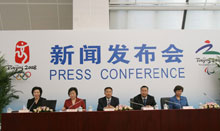北京承办奥运后的发展
在北京 奥运新闻中心举行的例行新闻发布会上,北京市发展和改革委员会副主任卢映川向媒体介绍了北京承办2008年奥运会以来(2001年至2006年)全市的发展情况。五年来,北京市按照"新北京、新奥运"的战略构想,坚决落实科学发展观,以奥运筹办为契机,着力创新体制、调整结构、优化环境、加强管理、全面发展,全市社会经济发生了一系列重大的新变化。
奥运新闻中心举行的例行新闻发布会上,北京市发展和改革委员会副主任卢映川向媒体介绍了北京承办2008年奥运会以来(2001年至2006年)全市的发展情况。五年来,北京市按照"新北京、新奥运"的战略构想,坚决落实科学发展观,以奥运筹办为契机,着力创新体制、调整结构、优化环境、加强管理、全面发展,全市社会经济发生了一系列重大的新变化。

Scene of the press conference
The preparatory work for the 2008 Olympic Games has served as a driving force for Beijing's social-economic development, which also provides good conditions for the Olympics, said Lu Yingchuan, vice-director of the Municipal Commission of Development and Reform.
At a press conference on Wednesday, he gave plenty of facts on the city's growth in the 2002-2006 period, which coincided with the preparations for the forthcoming Olympics.
The capital city's gross domestic product (GDP) grew at an annual rate of 12.1 percent, 1.3 percent up compared with the 1997-2001 period, and its per capita income surged to 6,210 US dollars, 1.9 times the 2001 level, and two years ahead of the government's goal. This development was achieved through a new growth pattern featured by lower resource consumption and waste emissions, Lu said.
The share of service industries, including financing, information, cultural creation, scientific and technological research and development reached 47 percent of the city's GDP for the period and the increase in consumer spending and investment were remarkable features of the demand.
From 2002 to 2006 Beijing spent 283.8 billion yuan (about 36.8 billion US dollars) in infrastructure, including 110 billion yuan (about 15.5 billion US dollars) in transportation, four times the sum of the previous five years.
The Olympic preparations have increased Beijing's international links, resulting in a 3.1 time surge in its trade volume to 158.1 billion US dollars in 2006 and a 49.4 percent rise in its use of foreign investment to 15.1 billion US dollars for the 2002-2006 period. Simultaneously, the city saw one million more overseas tourists.
The "Green Olympic" concept helped the city to improve its environment and make it more beautiful, according to Lu.
Vocabulary:
per capita income: 人均收入
growth pattern:增长模型
service industries:服务业